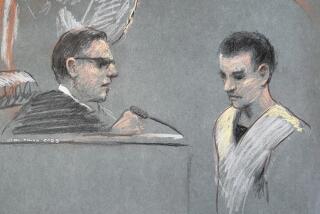Former NSA employee pleads guilty to lesser charge in leak case
Reporting from Baltimore — Thomas Andrews Drake, the former National Security Agency employee accused of leaking classified information to a reporter, pleaded guilty Friday to one misdemeanor count of “exceeding the authorized use of a computer.”
It’s a much lesser offense than the Espionage Act and false-statement violations Drake was originally charged with, and represents a major reversal of the government’s initial legal stance that he jeopardized national security.
“I hope this is the death knell of using the Espionage Act to send a message to ‘leakers’ who are more often than not whistle-blowers,” said Jesselyn Radack, who represents Drake in a separate case involving the NSA.
“This was the wrong person, this was the wrong case, and the Espionage Act was an overreach,” Radack said.
She said Drake would not comment himself until after the sentencing, which is scheduled for July 15, when the Department of Justice will also dismiss the more serious indictment against him.
He faces a maximum of one year in federal prison, though prosecutors said Friday that they would not oppose a “noncustodial” sentence — meaning one that does not include confinement. He faced more than 30 years in prison under the original 10-count indictment.
Drake, who had a top-secret clearance as an NSA employee, was indicted last year for retaining classified information, which prosecutors said he gave to then-Baltimore Sun reporter Siobhan Gorman between 2006 and 2007. Gorman wrote a series of articles about waste and mismanagement at NSA; she now works for the Wall Street Journal.
But Drake maintains that the information he gave Gorman was not classified, and that he handed the classified information over to investigators as part of a whistle-blowing investigation into wasteful agency programs.
He was never charged with leaking information, though his prosecution is widely viewed as a message from the Obama administration to discourage leaks. It is one of five cases being pursued by the federal government in court, and part of a larger strategy to shut down unauthorized disclosures of information, some open-government advocates said.
“Individuals who are granted special access to our nation’s most sensitive information cannot unilaterally decide to disregard the law and agreements they make with the government on how that information may be handled,” Assistant U.S. Atty. General Lanny A. Breuer said in a statement.
The Department of Justice said it agreed to drop the other charges against Drake and enter into the plea deal in part to avoid having to release classified information through the trial.
“We must always strike the careful balance between holding accountable those who break our laws, while not disclosing highly sensitive information that our intelligence agencies conclude would be harmful to our nation’s security if used at trial,” Breuer said.
In a joint statement released Friday, Drake’s federal public defenders, Deborah Boardman and James Wyda, said he “never should have been charged under the Espionage Act.”
“Tom never intended to harm his country. And he didn’t. We are grateful that Tom and his family can start to put this frightening chapter behind them,” they said.
More to Read
Sign up for Essential California
The most important California stories and recommendations in your inbox every morning.
You may occasionally receive promotional content from the Los Angeles Times.










